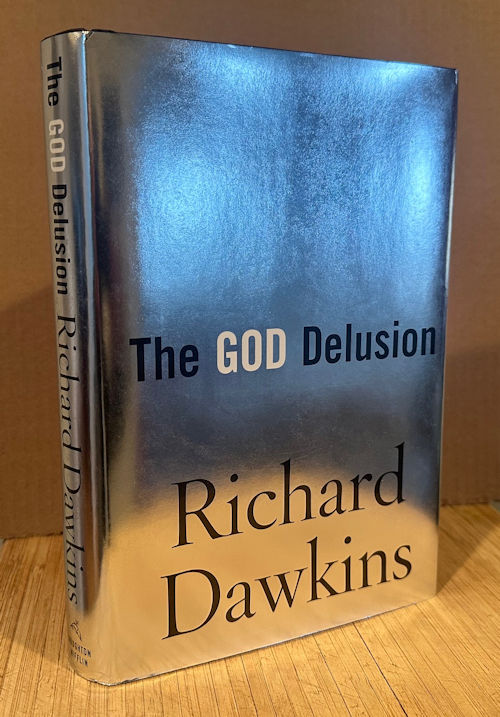(Houghton Mifflin, Oct. 2006, 406pp, including 26pp of appendix, books cited, notes, and index)
Of the four books published in the mid-2000s by the so-called “new atheists,” this one by Richard Dawkins was the most blunt and least conciliatory; it was frank, straightforward, and matter of fact. It covers all the basics, such as the arguments for God’s existence and why they are weak or implausible, and the reasons why it’s very unlikely that any god exists; then looks at the history of religion, the source of morality, how the moral zeitgeist has changed over the millennia, and the problems with religion and religious belief.
Dawkins was already a highly renowned evolutionary biologist at Oxford, famous for books including THE SELFISH GENE (which introduced the concept of “meme”), THE BLIND WATCHMAKER, CLIMBING MOUNT IMPROBABLE, and UNWEAVING THE RAINBOW.
I reread the book a couple years ago and took detailed notes. As with the Haidt book just summarized, I’ll reproduce those notes with some comments along the way, and at the end boil everything down to a one-page summary.
\\\
Preface
Dawkins tells how his wife didn’t realize that, as a child, she could have complained about her unhappy school experience. Her parents learned later; why didn’t she tell them? She didn’t know she could.
[[ Here I’ll interject a comment right away, to note that most people grow up automatically assuming the characteristics of their family and community. They acquire a last name without question; similarly they acquire a religion without question, even though a religion presumes many things about the world that are not verifiably true. But as Dawkins implies, you don’t have to. ]]
RD hopes this book will raise the consciousness of those unhappy with religion who just don’t realize that they can aspire to be an atheist… This is the first of his consciousness-raising aspirations.
[[ “Aspire to be an atheist”? OK, I’ll note this Dawkins blind spot. He doesn’t realize that very few people aspire to be an atheist, at least not publicly — because most other people take that to mean that you reject the constraints of the local religion and therefore can’t be trusted. It’s a matter of spin: people should aspire to be free of the irrational constraints of the local religion, along with the unsupportable supernatural claims, and learn to understand the world as it actually is. ]]
Dawkins comments how he hosted a British TV show in January 2006 titled “Root of All Evil?” (https://www.youtube.com/watch?v=IzZh2wstj88) Aside: John Lennon’s song “Imagine” has been altered by deleting the line about religion, or replacing it by “one religion too”.
Then he outlines the topics to be covered in the book, mentioning three other ‘consciousness-raising aspiration.’ The second is the power of cranes, such as natural selection, that aid in our understanding of the cosmos. The third is the issue of childhood indoctrination; RD objects to phrases such as ‘Catholic child’ and wants everyone to speak of ‘child of Catholic parents’ instead. The fourth is atheist pride; it’s not something to be apologetic about.
The religiosity of America is truly remarkable. The status of atheists is that of homosexuals 50 years ago. RD hopes this book will help them come out. Alas atheists are hard to organize, though they outnumber Jews…
RD defends the term ‘delusion’ and discusses how his quotes are often taken out of context.
It’s presumptuous, but RD hopes religious readers who pick up this book will be atheists when they put it down. And he comments:
Of course, dyed-in-the-wool faith-heads are immune to argument, their resistance built up over years of childhood indoctrination using methods that took centuries to mature (whether by evolution or design). Among the more effective immunological devices is a dire warning to avoid even opening a book like this, which is surely a work of Satan. But I believe there are plenty of open-minded people out there: people whose childhood indoctrination was not too insidious, or for other reasons didn’t ‘take’, or who native intelligence is strong enough to overcome it. Such free spirits should need only a little encouragement to break free of the vice of religion altogether. At very least, I hope that nobody who reads this book will be able to say, ‘I didn’t know I could.’






